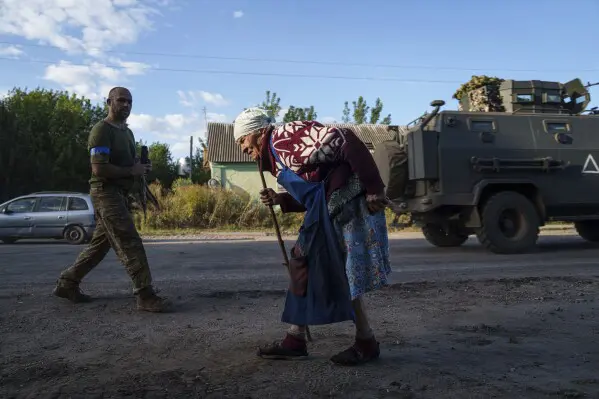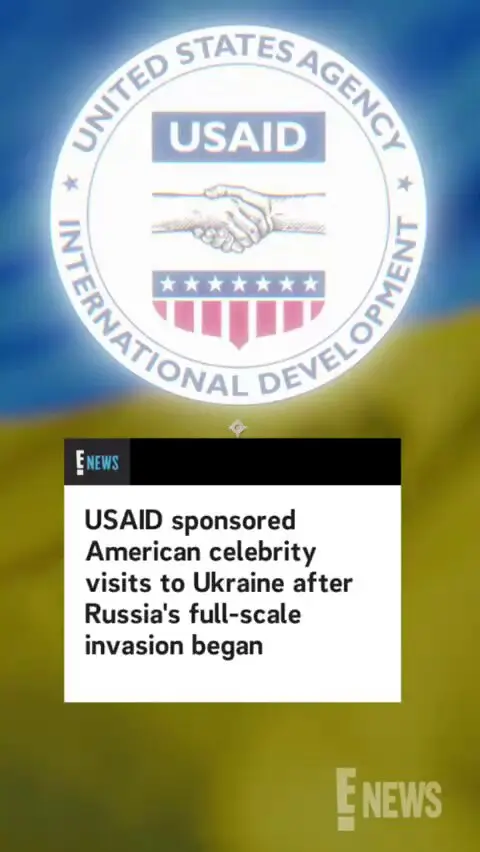Recent claims have emerged surrounding USAID allegedly sponsoring celebrity trips to Ukraine, specifically related to the ongoing conflict. These claims have sparked discussions and controversies within various circles, especially online. Understanding the nature of these allegations and separating fact from fiction is essential for both the public and the media. E! News, known for its coverage of celebrity news, has found itself at the center of this debate, following a series of misinterpretations regarding its reporting.
The Origin of the Claims
The initial claim suggesting that USAID was financially backing celebrities to visit Ukraine seems to stem from a video circulated on social media, notably amplified by prominent figures such as Elon Musk. This content presented the narrative that USAID had enlisted celebrities to garner support for Ukraine amidst the crisis. However, upon further investigation, it was discovered that these claims are not supported by any credible evidence.
Misunderstanding and Misinformation
It’s crucial to highlight that misinformation can spread like wildfire, especially in the age of social media, where a statement can be misrepresented or taken out of context. The video shared by Musk was noted for pushing an agenda that aligns with Russian propaganda. The implications of such claims are grave, not just politically but also in terms of public perception of foreign aid and celebrity engagement with humanitarian efforts.
What E! News Reported
Let’s clarify what E! News actually conveyed. Contrary to the claims that E! News confirmed sponsorship, their reporting did not substantiate these allegations. E! specifically highlighted the importance of fact-checking these notions before reaching a conclusion. Unfortunately, this vital piece of information seems to have been lost in the shuffle of sensational headlines and tweets.
The Impact of False Claims
False claims regarding well-respected organizations can lead to severe backlash and distrust, not only towards the entities involved but also to the supporting celebrities. For instance, the idea that celebrities would endorse or support a campaign under false pretenses casts doubt upon their altruism and commitment to global humanitarian efforts.
The Role of Social Media in Propagation of Misinformation
Social media platforms play a significant role in disseminating information rapidly, and while they have their benefits, they can also serve as a breeding ground for misinformation. The algorithms of popular platforms often favor sensational content, which may not always be factual.
Strategies to Combat Misinformation
Combating misinformation requires collective efforts from both the platforms and users. Here are some strategies that individuals and organizations can adopt:
- Always verify claims through credible sources before sharing.
- Familiarize yourself with fact-checking organizations.
- Engage in conversations about misinformation to raise awareness.
- Support transparent reporting from news organizations.
Case Study: USAID and Celebrity Interactions
Historically, various celebrities have engaged in humanitarian efforts, often collaborating with organizations like USAID. However, these engagements are usually transparent and account for donations and sponsorships publicly. Misunderstanding or misrepresentation of such partnerships can lead to unjust skepticism towards genuine initiatives.
Long-term Consequences of Misinformation
When misinformation prospers, it jeopardizes the credibility of altruistic efforts. Celebrities who have dedicated their platforms for public good may find themselves subjected to ridicule or unfounded suspicions, thus diminishing their ability to mobilize support for future initiatives. For instance, adverse narratives can overshadow the successes achieved through collaborations between celebrities and humanitarian organizations.

Highlight on USAID’s Initiatives and Celebrity Partnerships
USAID has a long history of partnering with various celebrities to amplify their messages and humanitarian efforts. These collaborations are typically geared towards raising awareness and funds for critical initiatives globally. In these partnerships, transparency and ethical considerations are paramount.
Notable Celebrities Supporting USAID
Many celebrities have partnered with USAID on various initiatives. Their involvement often includes public service announcements, fundraising events, and social media campaigns. Some examples include:
- Angelina Jolie
- Ben Stiller
- Shakira
These celebrities leverage their platforms to reach broader audiences and bring attention to critical issues. They often undergo a thorough vetting process to ensure their efforts are in line with the organization’s mission.
The Importance of Transparency in Charity
Transparency in charitable works is vital for credibility. It sets standards for engagement and clarity in intentions. For celebrities, being open about their commitments ensures they are trusted advocates for the causes they support. This includes sharing how the funds are being utilized and results achieved through these partnerships. E! News’s lack of confirmation regarding USAID and celebrity sponsorship of trips serves as a reminder of the need for diligence in such claims.
Understanding the Landscape of Celebrity Activism
Celebrity activism has gained momentum over the years, encouraging people to mobilize support for various causes. This phenomenon has allowed organizations like USAID to benefit from increased visibility and expanded outreach efforts. The juxtaposition of positive narratives against misinformation presents challenges that need to be addressed systematically.

Conclusion: A Call for Responsible Information Sharing
As consumers of news, we must be vigilant and discerning about the information we encounter. The allegations surrounding USAID’s sponsorship of celebrity trips to Ukraine are a prime example of how easily misinformation can spread, potentially damaging reputations and diverting attention from genuine humanitarian initiatives. By fostering an environment of responsible information sharing, we contribute to a more informed society.
The Role of Individuals in Media Literacy
Encouraging media literacy among everyone is essential. Understanding how to critically assess information helps prevent the dissemination of misleading narratives. Educational initiatives aimed at promoting media literacy can pave the way for a more robust and informed public.
Contributing to Accurate Reporting
Supporting news organizations that prioritize investigative journalism can lead to more accurate reporting and accountability in the media landscape. Consumers should actively seek out reputable sources to stay informed and question narratives that seem dubious.

Source: www.reuters.com
Hi there! I’m Jade, a 38-year-old gossip journalist with a passion for uncovering the juiciest stories in the world of celebrity news. With years of experience in the industry, I love sharing the latest trends and insider scoops.



